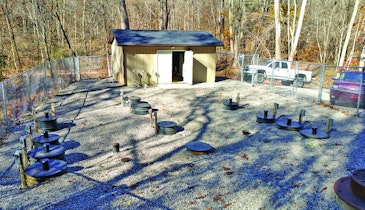
Interested in Education/Training?
Get Education/Training articles, news and videos right in your inbox! Sign up now.
Education/Training + Get AlertsStreamlining wastewater codes for onsite systems used seasonally and tweaking impractical licensing requirements for septic system inspection and repairs are among initiatives being addressed by the Minnesota Onsite Wastewater Association in 2015.
MOWA represents all onsite wastewater professionals in the state as a nonprofit business association. Founded in 1975, it has about 1,000 members representing around 200 businesses and organizations, from installers, pumpers, designers and inspectors, to soil scientists, engineers, regulators, educators, manufacturers and suppliers. Brian Koski is the group’s current president.
How do you develop your annual strategies?
Koski: We have a planning meeting every year, and that’s where we, as a board of directors, set our goals. We talk about the challenges we face as an organization or industry, prioritize them, and go to work on the top three or so. We also go through last year’s goals and what we accomplished. I’ve been on the board for five years and we generally accomplish what we set out to do.
What are your goals this year and how did you do last year?
Koski: A few of our goals for 2014 included establishing a grant foundation for nonprofit groups that needed help updating failing septic systems. That foundation was established last year. Applicants may receive labor and financial support from MOWA to help them get a septic system update completed.
We also wanted to make a better effort to recognize members who have been involved in the industry and have made a significant impact in our state. Three of our long-term members received legacy awards at our winter conference. All three have been in the industry and involved with MOWA for more than 30 years, in which time they contributed more than their fair share on a volunteer basis.
At our strategic planning session, we decided as a board that continuing to improve our summer seminar and winter convention were near the top. Also, continuing to follow through with our legislative efforts is important.
What are the issues facing Minnesota’s onsite industry?
Koski: There are several legislative hot topics. A big one is seasonal businesses such as resorts and campgrounds that are facing some challenges with the way our current code is written. They may have to comply with some stringent rules even though they are seasonal operations. We are working on that right now.
When the code was updated in 2008, it created three levels of designers: basic, intermediate and advanced. You need an advanced license to work on large or difficult systems with things like pretreatment. The number of people who have that license is pretty small, so it’s hard in a lot of counties to find contractors who can do the work. The Minnesota Pollution Control Agency (MPCA) is working on revising who can do what. We hope to provide input on this subject as well.
Another one deals with people whose certifications lapse or who don’t get their continuing education in the three-year window. They not only lose their license and are out of work, but they have to retake all the tests again. It’s a pretty severe penalty, so there’s some talk of revamping that to maybe allow a grace period.
The MPCA is involved in all of those issues, so we’re working closely with them on solutions.
How is the relationship with regulators?
Koski: We’ve worked hard the last six to eight years to really improve the relationship, and I think we’ve accomplished that. They generally reach out to us for our stance on issues, which is nice. It’s challenging to come up with a consensus of all the parties, but trying to work together, side-by-side, is more effective.
In the last two years, we had a pretty complicated issue involving the sewer line from the house to the septic tank, which falls under the plumbing code and really wasn’t enforced that much. As far as inspecting that part of the septic system, it was never really done. There were also issues with jurisdiction. The Department of Labor and MPCA were involved along with several other agencies. There was a lot of jurisdictional overlap that made it complicated. One of our board members, Nick Haig, also works for MPCA. He and others in the agency spent a lot of time and energy working on that, and they are nearing a solution that will streamline the process.
What kinds of issues do you see ahead of you in Minnesota?
Koski: At our conference (last) January and in 2014, there was a lot of talk and we had presentations about groundwater issues, drought, aquifer levels dropping and things like that. Not only do we have to be seen as part of the solution, but also be a voice about how things are handled through rulemaking.
One of the things I think we can contribute is making sure that the water we put back into the ground is properly treated. Especially with the larger systems, we have to look at nutrient removal and making sure that if we’re putting a lot of water into a small area, that by the time it reaches the groundwater, it’s safe to drink. Maybe pharmaceuticals in the water will become something we have to address through system design.
You have the University of Minnesota Water Resources Center. What’s that relationship like?
Koski: They have long been seen as one of the leaders in education for the onsite industry. You see their instructors going all over the country speaking at conferences, and that really shows that they’re seen as respected leaders. They do the majority of the continuing education in Minnesota and also put on the licensing courses.
We have had input on the courses, what goes into them and how they can be improved. The courses are pretty well developed now, so we don’t have as much input as we did in the past. When the new licenses came about, we had a lot of discussion on the training and design guidance. One of the things we’d like to see is more online courses and training that is more accessible so companies can train their own employees.
We’ve always had a really close working relationship with them, and they’re heavily involved with our conference. The education at our winter conference is top-notch, along with the networking opportunities. We normally have about 200 people attending and offer more than a dozen classes for continuing education. We also have a one-day summer soils seminar.
What unique services do you provide for members?
Koski: We have a group business insurance plan that spreads the risk among everybody who participates. It’s very economical, and if we do well, we generally get a distribution back at the end of the year. It has more than paid for itself.
One service that we’re really proud of is our bimonthly newsletter. The Little Digger is on our website (www.mowa-mn.com) and is very informative, about 18 to 20 pages, and focuses on the science and technology of onsite wastewater, along with industry concerns.





